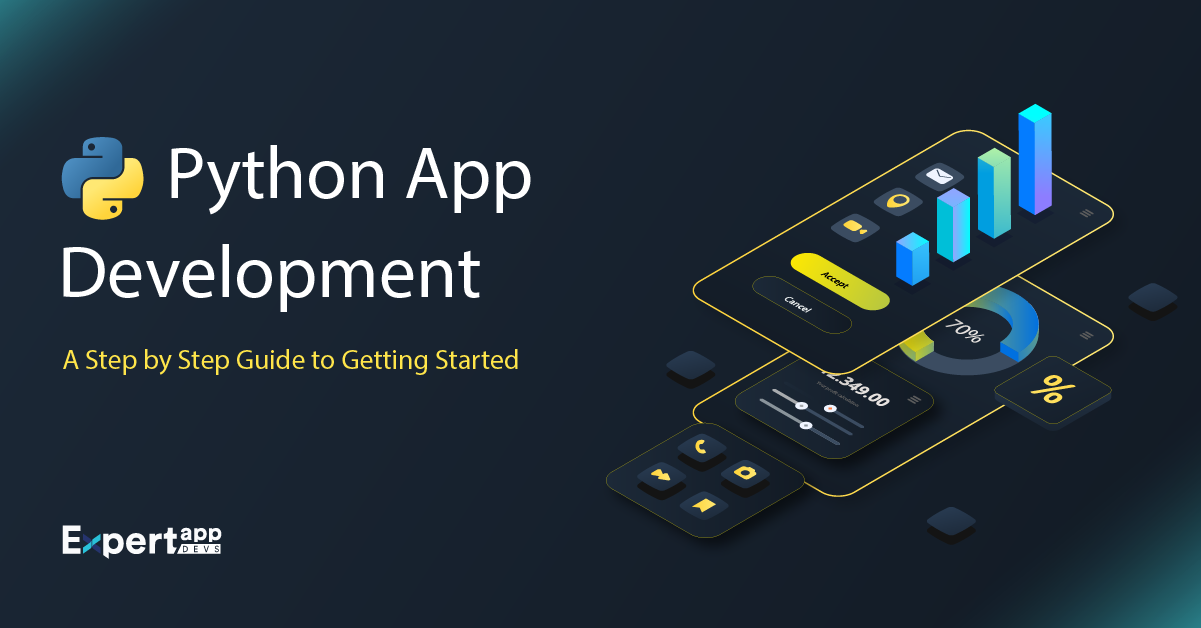Python App Development - A Comprehensive Guide
Technology is fast-evolving, and there is no denying it. Along with fast-paced tech, users demand lightning-fast app solutions and enhanced interactions. At least 50% of users tend to move away from your business because your app is slow.
No longer can you develop a minimum feature website or application. People demand convenience (in-app payments), personalization (recommendations), and integration (connect their apps with other apps or services). With the new-age technologies such as Blockchain, AI, and AR taking to the fore, you cannot live with a technology stack that feels old and boring.
Many developers have moved to Python app development owing to its next-gen attitude and new-age personality. This programming language is a game changer for both web and mobile apps.
Benefits of Python App Development
Python is an upcoming programming language that offers extensive capabilities to the developer. Let’s look at how it will enhance development.
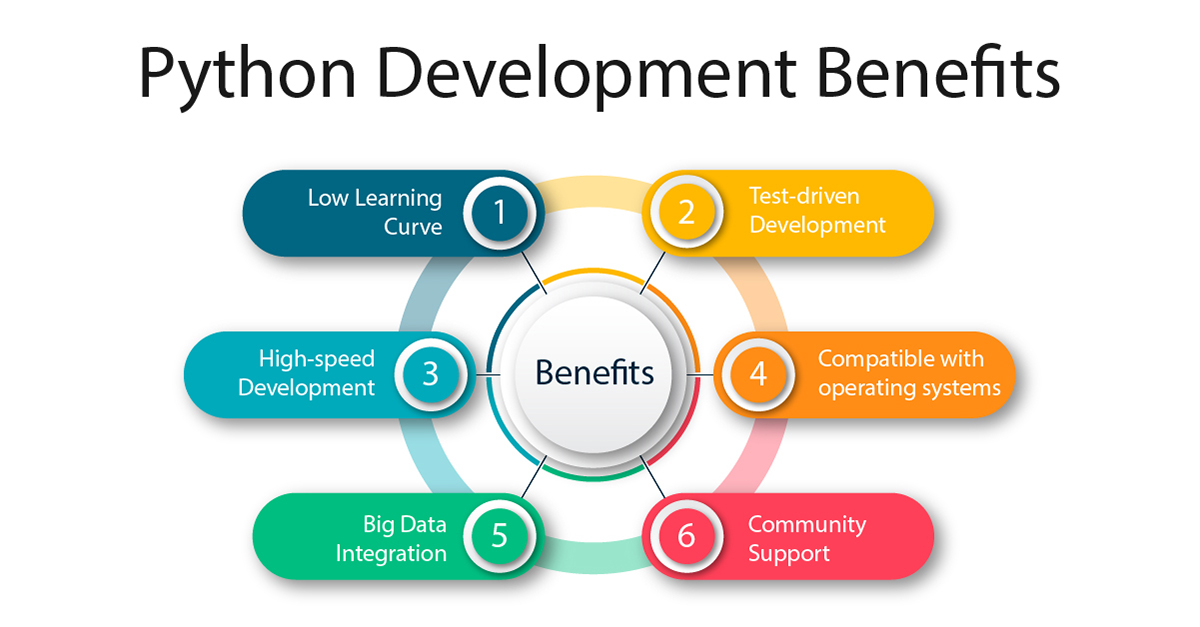
1. Low Learning Curve
It comes with a low learning curve that indicates developers can quickly grasp the contents and learn the language. It is one of the simplest platforms to understand and comprehend. With Python app development, you can easily create concepts and include features without working on additional code.
This language can simplify all the complex details, thus making it the best fit for beginners.
2. Test-driven Development
When you finish developing and then sit to test the app, it can take a lot of your time. To speed up the process and ensure quicker development and faster deployment, you should consider opting for test-driven development. It will make sure that the apps are tested during the development stage.
Python makes it easier for developers to plan to test their models during development. You can also build apps directly from prototypes using this programming language.
3. High-speed Development
In Python, apps are added and run in the compiler. As a result, you don’t need to compile the app separately, thus saving a lot of your time. You can get feedback on the app quickly and ensure bugs are identified as early as possible. With this language, you can quickly finish and execute your applications, thus preparing them for deployment.
4. Compatible with operating systems
One of the biggest advantages of this programming language is that it is compatible with all operating systems- iOS, Windows, Mac, and Android. You should use the interpreter tool to run and use the apps across the different tools. You can use the same Python code across frameworks and prepare your app for different platforms.
5. Big Data Integration
Big Data is something that all apps with emerging technologies use for predictive analytics and more. Python libraries extend support to Big Data Integration. Most databases prefer using Python app development to integrate the data analytics structure into the mobile or web application.
6. Community Support
App developers crave community support as it helps them simplify the development processes. A community can prevent you from writing lines of code when only two are enough for creating the app.
Python has a huge community with the right documentation, plans, and tutorials to help you prepare for the next app needs.
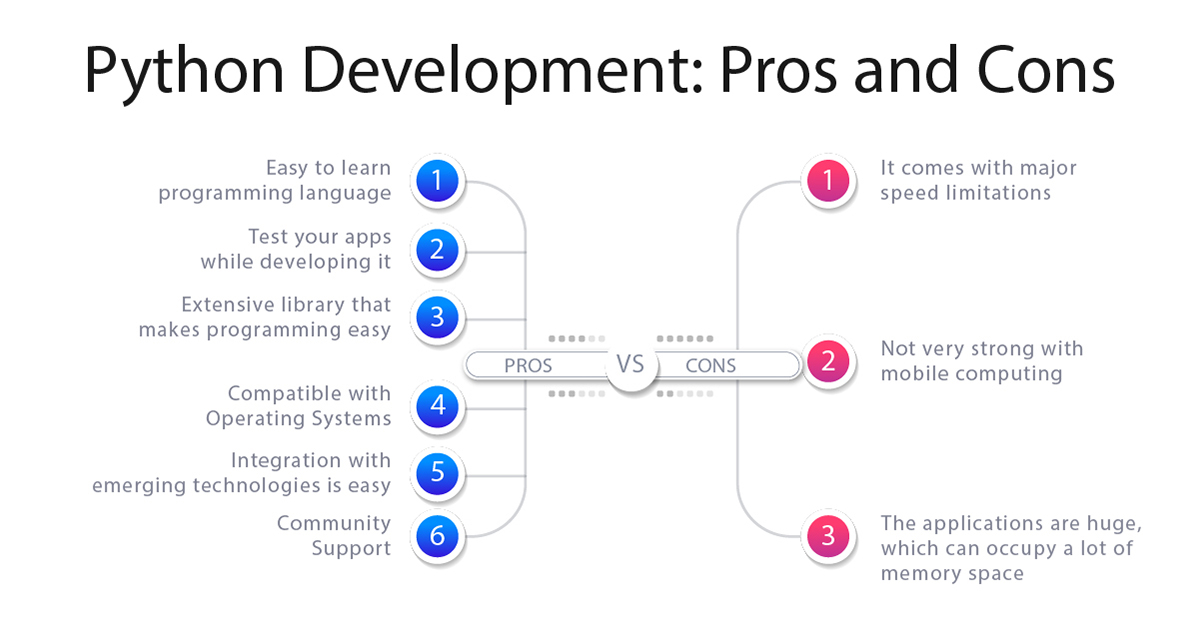
When to Use Python for Business App Development?
Python is used for high-end applications that include emerging technologies. As it is an interpreted language, it makes development easy for startups and enterprises. Let’s look at all the different types of apps that you can create with Python app development.
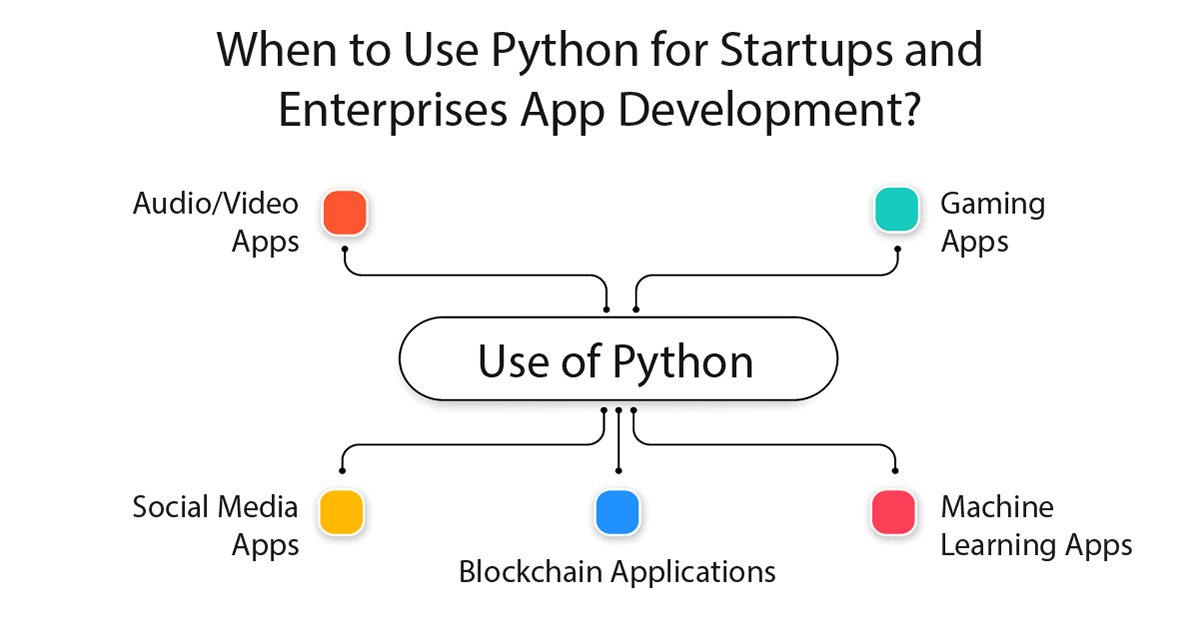
1. Audio/Video Apps
Users are looking for audio/video content online. There are a lot of opportunities for this type of app. With the inherent libraries available with Python, you can develop an incredible audio/video app that can improve the user experience. YouTube is an example of how you can use Python app development frameworks and libraries to deliver such experiences.
2. Gaming Apps
Several gaming apps are built using Python. The technology offers compatibility, dialog trees, and level designing, which makes app development easy.
Pirates of the Caribbean and Panda 3D are games built using this framework.
3. Social Media Apps
With the heavy footprint that Python programming language offers, it is easier to build need-based social networking apps for your business. Instagram uses Django and can handle the millions of customers that flock to the platform.
4. Blockchain Applications
Blockchain apps require strong and secure technology that can take care of transparent operations.
It is an easy-to-use application with a building block type framework. It allows users to develop solutions with ease. It can help generate the HTTP requests needed to interact with Blockchain on the Internet.
5. Machine Learning Apps
The algorithm within a Machine Learning app is developed through data sets. The machine studies the patterns devises unique sets and creates a logic that improves the app usability. Python has libraries that help with Machine Learning within the applications. You can even use it with a GNU license.
Top Apps Built with Python
- Instagram: We already saw how Instagram used Python to manage the increasing load and database of the social networking solution. The programming language helps the application scale with ease.
- Pinterest: This application uses Python and Django so that they can process significant content and data with ease. It was built using the Python framework.
- Spotify: Python is a high-speed framework and can handle large amounts of data easily. That’s why Spotify uses Python.
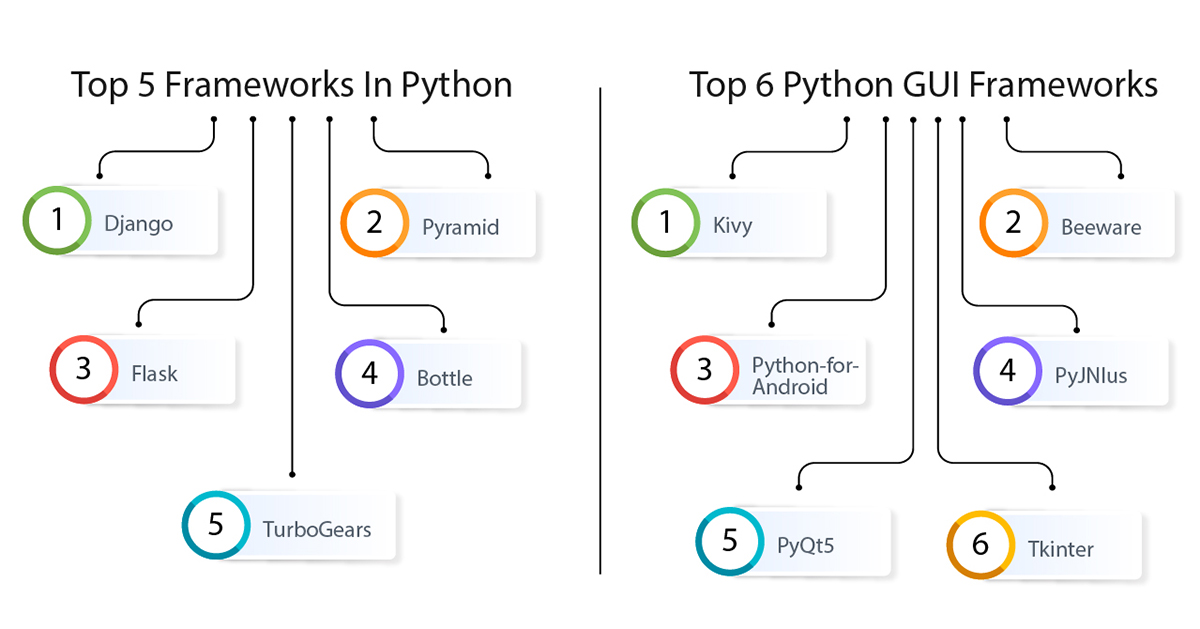
Python Frameworks You Should Know
If you are planning Python app development, you should know the frameworks that can support your vision. Here are all the top Python frameworks to know.
1. Django
Using this open-source and advanced Python framework, you can simplify app development. It helps break down the complex codes and logic for a simple and efficient Python application. It helps improve the overall app performance and is popular as it provides stable applications. With a strong community, it is developers' number one choice.
2. Pyramid
Whether you want to develop simple or complex applications, this Python framework helps you avail all types of solutions. You can use this to create prototypes and ensure superior development. This framework typically follows the MVC architecture, which makes developing the logic into a solution easy.
3. Flask
This is a micro web framework that allows customization of web code. You can use it to improve the security of the application, enhance cross-site scripting and improve client-side data security. It comes with integrated support for unit testing, which means you don’t need separate libraries or frameworks to create apps using Flask.
4. Bottle
This is another popular micro web framework, offering a simple and single library. You can use it for routing, templating, and utility documents. It extends support to HTTP development.
5. TurboGears
It is built on a WSGI server and is one of the most flexible frameworks of Python. You get full-stack features or micro web framework as per the needs of the website or application.
Python GUI Frameworks to Know
For Python mobile app development, you need a GUI initial. That’s where the GUI frameworks play a pivotal role. Here, we will take you through the top GUI frameworks can use for the next Python app.
1. Kivy
If you want to develop a multi-touch mobile app using Python, Kivy is the best framework. It comes with a natural user interface which you can use for development. This GUI can work across platforms and operating systems. Use Python libraries such as Cairo and GStreamer to develop the application.
2. Beeware
For native-like Python mobile app development, this is your go-to framework. This framework includes Toga, OS native, Python native and the GUI toolkit needed to build cross-platform apps.
This application framework also contains the Python installer and the library tool that you can use along with Objective C for MacOS.
3. Python-for-Android
If you want to use Python to develop Android apps, use this framework. It creates the project folder and lets in all the tools needed to develop an application. You will find Kivy, Pygame, and SDL in this folder.
4. PyJNIus
If you want to connect Python with Android API, you should use this framework. This allows developers to find the required information from different parts of the mobile device and introduce it to the framework.
5. PyQt5
This works with the Qt framework, which helps with cross-platform Python mobile app development. It comes with Python wrappers and the current version of the Qt framework. You can use this framework to build applications for Windows, Mac, Linux, and Android, among other platforms.
6. Tkinter
This is a modern Python GUI framework that allows developers to create a sophisticated interface. The visual elements are known as widgets, and they can be customized to suit your needs.
Beeware vs Kivy: A Quick Comparison
| Kivy | Beeware |
|---|---|
| It has a custom UI toolkit to build the interface. you will need to ensure the same experience across platforms | It uses the framework’s or platform’s native UI toolkit to develop the interface. In this case users get the same native-like experience throughout the app |
| Kivy is used when you want rapid application development | It is mainly used for robust and secure application development. You may take time when developing an application with Beeware |
| It comes with a clear syntax, which makes coding simple with this framework | It is still in the nascent stage, so the community is still exploring the possibilities with this framework |
| The same codebase is used across platforms | In this case, the native codes are used to present the native |
Note: Both frameworks have a huge community backing.
How to Develop your First Python App?
Here are all the steps to follow to build your first Python app.
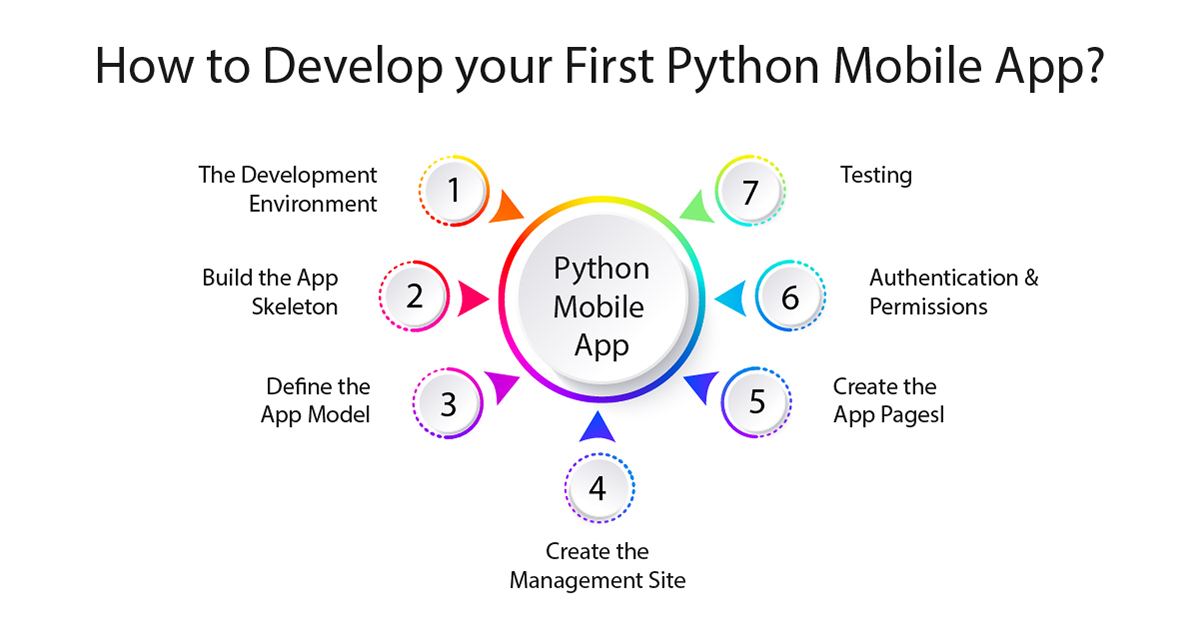
1. The Development Environment
The first step is to identify the development environment – iOS, Linux, Windows or Mac. This will help you establish the virtual environment for coding and testing the application. When you define the development environment, you will remove the need for version dependencies, reducing the complications in app development.
2. Build the App Skeleton
The architecture of the web app is more important than the design. It is the architecture that will define the model, view and controller for your application. You can build separate projects for the various components using Python. You can use the application on different URLs, then run a database migration before you take control of the app stability. By building the foundation, you make the apps more stable.
3. Define the App Model
It is important to plan the structure of the data, which is why you need to define the app model. You can describe the limit set for a single element, label text for forms, and other components with this model.
4. Create the Management Site
You will need an admin site that can help control your web application. You can create, view and even remove the fields that you yield necessary for your application. You can even define the ModelAdmin Class that helps modify the models from the admin site as needed.
5. Create the App Pages
It is now time to code the different dynamic pages and add it to your application. You can describe the URLs by encoding them in the body of the application. Use the View function to retrieve data. With this, you will notice that the database doesn’t add additional data to the HTML template when fetching the query, which reduces overall load.
6. Authentication & Permissions
You can plan role-based app access with Python. This allows a different session for the different users. You can allow users to login and log out of these applications, which can improve their ability to start and stop the session.
You can add new user groups depending on the access you want to give.
7. Testing
You can divide your app testing into three segments- unit testing, integration tests and regression tests. You can use automation and manual testing with Python framework.
Hire Dedicated Python Developer
Here we discussed how you can get started with Python app development. We talked how Python’s libraries, speed and low learning curve can help businesses get a headstart with app development. It also shows how Python frameworks and GUI instances can help developers with an intuitive interface and architecture.
Expert App Devs is an expert in Python app development. With our experience in developing exceptional app solutions for startups and enterprises, we can develop and deploy apps for all ideas and industries.
If you have an app idea that will work with emerging technologies, we have the rightful app solution for you. Connect with our team using the contact form, and we will respond within 24 hours.
Let’s answer a few frequently asked questions about Python before closing.

Frequently Asked Questions
1. Which is the most popular Python framework?
Django is the most popular Python framework that developers use to create mobile or web applications.
2. Is python suitable for mobile or web application?
Python is best-fit for both web and mobile applications. Choosing the right development environment and framework can help you develop & deploy your apps with ease.
3. Are Python and Java similar?
No, both are completely different programming languages. Python is dynamically typed language while Java is statically typed.
4. What are some of the use cases where you can consider using Python?
Blockchain apps, game app development and social media apps are some of the use cases for Python. You can also use the framework to develop social networking applications.
5. How to improve the performance of your Python app?
Here are a few ways to improve the overall performance of your python mobile application:
- Use profilers such as cProfile to gain statistics about the CPU usage so that you can optimize the utilization and improve performance
- Continuous profilers allows you to get a line-by-line performance insight into the Python mobile app
- Ensure the code snippets for Python app development are small and light
- You can mix and match coding approaches to make the operation smooth and performance better
- While coding a program, ensure you use too many loops as it can increase processor time, and impact the performance
 Jignen Pandya
Jignen Pandya
